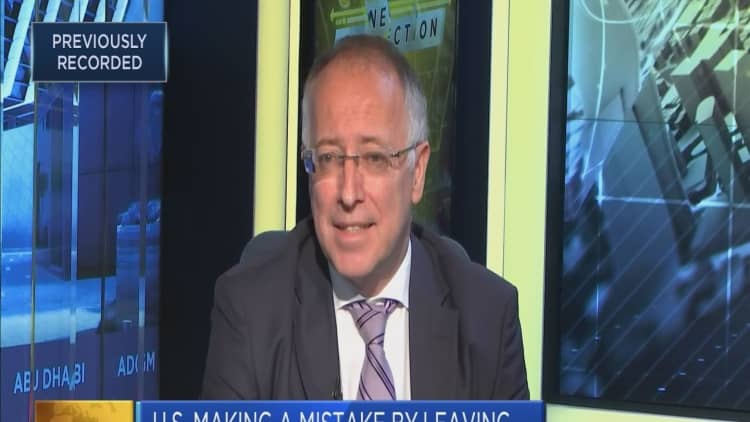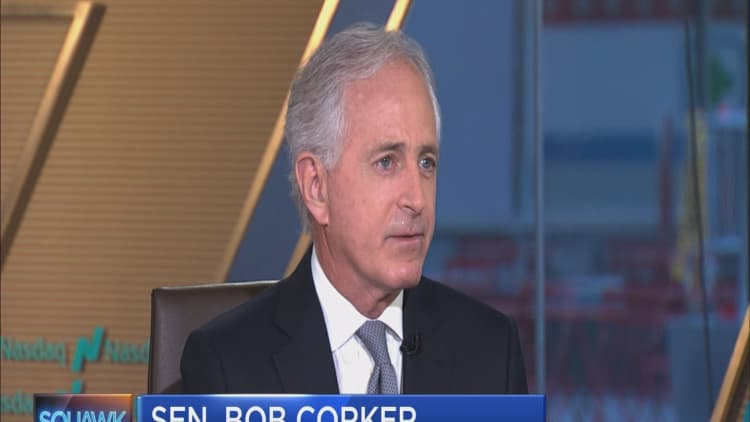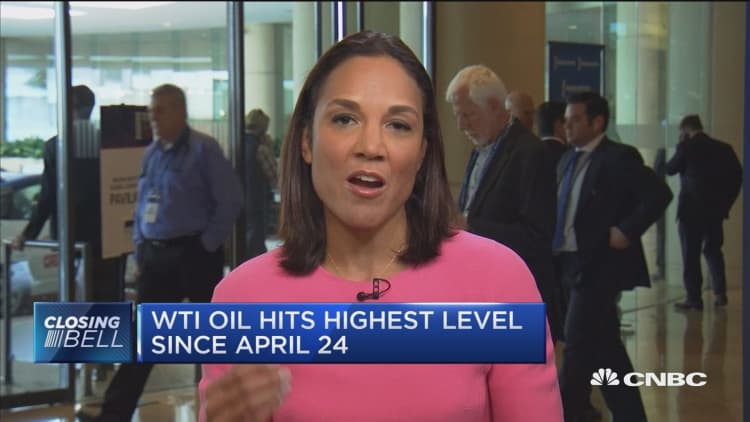President Donald Trump appears poised to withdraw the United States from the 2015 Iran nuclear deal on Tuesday by announcing he'll restore sanctions on Iranian oil exports. But analysts say the impact of those sanctions on the market would not have the same bite they had under Trump's predecessor.
The United States wields considerable power over the global financial system, but if Trump does move to renew sanctions on Iran's oil exports, he will be acting against the will of the international community. Unlike President Barack Obama, he will not be able to count on some major buyers of Iranian crude to close their import terminals, according to several widely followed analysts.
That means U.S. sanctions will likely only remove 300,000 to 500,000 barrels per day of Iranian oil off the market, compared with the 1 million to 1.5 million barrels the Obama administration curtailed. The world consumes about 100 million barrels a day.
Even then, it will probably be six months or more until the worst of the disruptions occur, opening a window for continued negotiations that could preserve the deal, analysts say.

"This time, we don't think it will be anywhere near as successful as it was in 2012," said Edward Morse, global head of commodities research at Citi.
"This time, we think the easy pickings are just more limited," he said.
Morse says he sees little evidence the Trump administration has engaged in the kind of petro-diplomacy Obama's deputies waged.
Before the late 2000s, the United States had little success forcing other countries to isolate its long-time rival Iran. But the Obama administration secured support from major purchasers of Iranian oil in Europe and Asia based on evidence that Iran was operating a secret nuclear weapons research program. Tehran denies it attempted to build a nuclear weapon.
Several rounds of sanctions compelled Iran to negotiate with a group called the P5+1: China, France, Germany, Russia, the U.K. and the United States. The 2015 accord limited Iran's nuclear program and required Tehran to allow international inspectors into the country.

Iran's oil exports have rebounded to about 2.5 million barrels a day from roughly 1.1 million barrels a day in 2014 when sanctions were still in place.
Now, Trump wants to rewrite the terms of the deal, which he thinks is not tough enough. The other members of the P5+1 want to keep it in place because Iran has been in compliance with the deal since it was implemented.
Trump threatened in January to restore sanctions on Iran unless Europe meets his demands by May 12, when he faces the next waiver deadline. As of this week, no deal emerged despite Trump's meetings with French President Emmanuel Macron and German Chancellor Angela Merkel.
"I think looking at the discord among the P5+1, it seems the amount of oil that would be removed would be lower, and at this point maybe 300,000 to 500,000 barrels a day," said Daniel Yergin, Pulitzer Prize-winning author and vice chair of IHS Markit.
With little international support, Trump will have to use U.S. clout over the financial system to give the world a choice: You can do business with the United States, or you can do business with Iran.
"While there is considerable debate over the effectiveness of unilateral US action on Iran, we think that a revival of the threat to lock non-compliant corporates out of US capital markets provides the White House with a pretty powerful stick," Helima Croft, global head of commodity strategy at RBC Capital Markets, wrote in a research note Friday.

Still, analysts expect participation to be lumpy. They say much of Europe, South Korea and Japan will curtail their purchases of Iranian oil to protect their close ties with Washington. But India and Turkey may push back and China will likely flatly refuse.
Timing also remains a question. The Obama administration asked buyers to cut their imports of Iranian crude by 20 percent every 180 days. If Trump follows the same model, that could push the impact into the first half of 2019, according to Croft.
To be sure, some companies may start counting barrels and making reductions immediately. There is some evidence this is happening now, according to Richard Nephew, a senior research scholar at Columbia University's Center on Global Energy Policy who was a lead sanctions expert for the Iran nuclear deal.
Despite this, Nephew is in the camp that sees Iranian exports falling by fewer than 500,000 barrels a day.
"Over time that reduction will get smaller unless" the Trump administration is "able to get China and India" to participate, he said in a conference call with reporters Friday.
Analysts say oil prices are likely to spike or drift higher if Trump pulls out of the deal this week, fueled by geopolitical risk and uncertainty. But the market could back off highs as traders digest the terms of the exit and the pace of export declines from Iran.
Citi's Morse notes that traders have recently placed a record number of bullish bets that oil prices will keep rising. That makes the market susceptible to sharp bouts of selling that drag down oil prices.
The market got a preview of this last week, he said, when prices spiked after Israeli Prime Minister Benjamin Netanyahu revealed a cache of stolen files on Iran's nuclear research. Crude prices dropped sharply as it became clear there was little new information in the trove of documents and no evidence Iran violated the terms of the nuclear deal.


